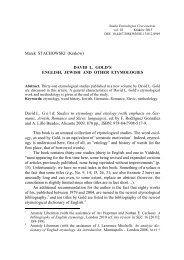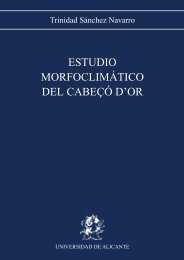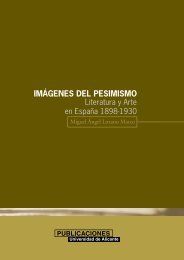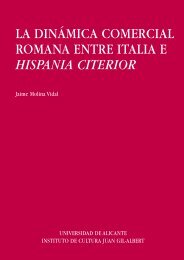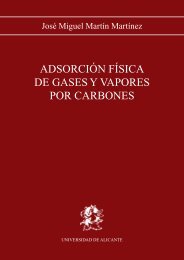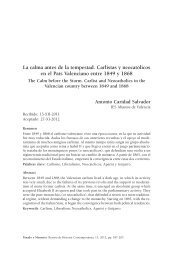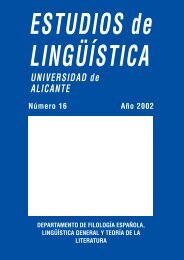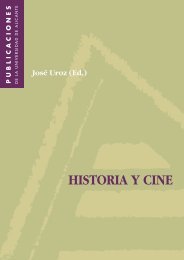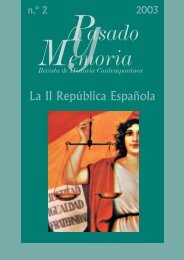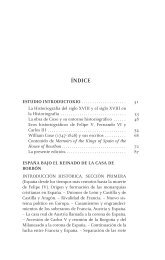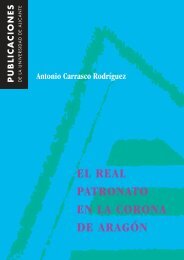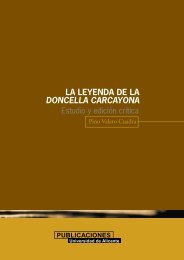English and Galician in the Middle Ages - Publicaciones ...
English and Galician in the Middle Ages - Publicaciones ...
English and Galician in the Middle Ages - Publicaciones ...
Create successful ePaper yourself
Turn your PDF publications into a flip-book with our unique Google optimized e-Paper software.
1. Introduction<br />
CONTENTS<br />
<strong>English</strong> <strong>and</strong> <strong>Galician</strong> <strong>in</strong> <strong>the</strong> <strong>Middle</strong> <strong>Ages</strong>:<br />
A Sociohistorical Survey<br />
Begoña Crespo García<br />
It is <strong>the</strong> aim of this paper to offer a new perspective on <strong>the</strong><br />
analysis of <strong>English</strong> <strong>and</strong> <strong>Galician</strong> by compar<strong>in</strong>g <strong>the</strong> sociol<strong>in</strong>guistic<br />
situation of <strong>the</strong>se languages <strong>in</strong> <strong>the</strong> <strong>Middle</strong> <strong>Ages</strong>.<br />
The paper will be organised <strong>in</strong>to four sections: section 1 will<br />
depict <strong>the</strong> common history of both communities <strong>in</strong> <strong>the</strong> <strong>Middle</strong><br />
<strong>Ages</strong>, referr<strong>in</strong>g particularly to <strong>the</strong>ir contacts with Norman/<br />
French (note 1) <strong>and</strong> Castilian, respectively. Section *2 will be<br />
devoted to <strong>the</strong> divergent evolution of both languages detail<strong>in</strong>g<br />
<strong>the</strong> behaviour of <strong>the</strong> ma<strong>in</strong> social strata. In order to complete<br />
<strong>the</strong> sociol<strong>in</strong>guistic analysis, section *3 will explore <strong>the</strong> effects<br />
of bil<strong>in</strong>gualism <strong>and</strong> diglossia on <strong>English</strong> <strong>and</strong> Castilian as a<br />
means to illustrate <strong>the</strong> great <strong>in</strong>fl uence external factors can exert<br />
on <strong>the</strong> correspond<strong>in</strong>g l<strong>in</strong>guistic community. F<strong>in</strong>ally, section<br />
*4 will summarise <strong>the</strong> conclusions reached <strong>in</strong> <strong>the</strong> light of <strong>the</strong><br />
proposals previously mentioned.<br />
2. Two events <strong>in</strong> history<br />
In <strong>the</strong> early <strong>Middle</strong> <strong>Ages</strong> <strong>the</strong> status of Lat<strong>in</strong> as a language of<br />
culture <strong>and</strong> prestige was unquestionable (Tout, 1922; Clanchy,<br />
1993). Hence, its usage <strong>in</strong> offi cial records <strong>and</strong> for scholarly<br />
purposes. In this sense, Engl<strong>and</strong> <strong>and</strong> Galicia were not exceptions.<br />
Never<strong>the</strong>less, <strong>the</strong> existence of vernacular literature, a<br />
native rul<strong>in</strong>g class <strong>and</strong> a certa<strong>in</strong> level of political <strong>in</strong>depend-<br />
7



